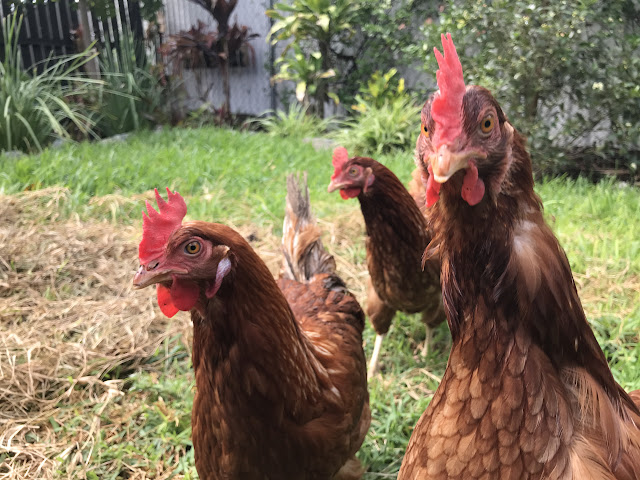Chickens: pets, not food
 |
| From left to right: Karen, Gretchen, and Regina |
Over the last several months, one of our hens, Karen, started to lay a few large, thin-shelled eggs a week. Many would break during laying. This was despite supplements and a well-rounded diet. Everything else was unchanged; she was eating well, pooping well, pecking, scratching, moving...
Last week, Rob saw a bit of blood and gunk coming out of her vent. We suspected a prolapsed vent but it looked normal. We kept an eye on it and it was fine... until a few days ago. She laid a large egg and had a prolapse. Behaviour was still completely normal, and the other chooks paid no mind either (apparently, other chickens can attack the sick hen). When the prolapse didn't retract itself, we took her to a bird-specialist vet.
Here's what we learned from him:
- It is very common; the vet said he sees these at least daily.
- It is serious, but fortunately Karen's was not an extreme case; she had hers manually reinserted.
- It is likely hers was caused by the strain of being a small chicken laying too large eggs, though sometimes space-occupying lesions may be the cause (she was cleared of tumour).
- Without treatment, the chook will die, and some people will opt to euthanase their bird.
- Otherwise, a hormone implant is needed to stop egg-laying; these last for about 6 months and will be needed the rest of her productive years (237AUD a pop).
- The hormone takes nearly a week to kick in, so if there's an egg already forming in her, the prolapse could reoccur when she lays.
- Prolapses can be sutured in, but this requires expensive anaesthetic (500AUD), and hormone implant is still needed. We decided against this, for now.
- Pain killers and antibiotics are also on the bill (100AUD).
Most importantly, we learned that, while we initially bought our hens for a supply of free-range eggs, our opinion has changed about them:
- They are our pets, not stock.
- Their health is a priority over eggs.
- We are likely keep up with hormone therapy for Karen even if that means no more eggs from her
- We are never going to buy ISA Brown or other hybrid hens again; they were engineered to push out an egg a day to the detriment of the poor hen.
Comments
Post a Comment